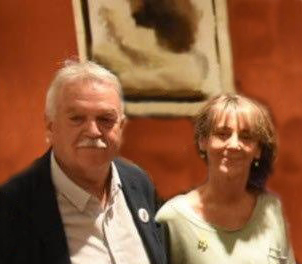Spain has been an egregious example of how the EU supports fascist institutions such as Spain’s Supreme Court, just as it supports enedemic corruption. These are not flaws, they are essential elements of the the raison d’être of the EU.
Toni Strubell is a former MP in the Catalan Parliament, journalist, and author of What Catalans Want
Núria Bassa Camps is a Catalan writer and photographer
Llegeix en català aqui
For the first time since the very imperfect arrival of democracy in Spain, the struggle for supremacy in the key institutions of the judiciary has erupted in a constitutional crisis of major proportions. In recent weeks, observers on the left have interpreted this situation as a form of Coup d’État instigated by the Constitutional Court to undermine the power of the government. Indeed, for years there has been a very real sense in Spain that when the conservatives were out of power, they continued to run the show by way of their predominance in the law courts. Indeed, one Partido Popular parliamentary spokesman was even (accidentally) recorded boasting about his party’s power to “control the back door” to the Supreme Court, as was so clearly visible during the trial of the Catalan government in 2019. On the other hand, the right cynically portray the government’s recent legislative initiatives, aimed at unblocking the paralysis of the judicial institutions, as a “dishonest” attempt to regain ideological supremacy in the law courts. My God, just look who is talking! But whatever one’s position may be, there is no denying that the predominance of right-wing judges has been the norm for 10 years, thus allowing just about any offence committed by the Partido Popular to be muffled, condoned or, if the worst came to the worst, simply pardoned. Not that the situation changes much when it is Socialists that are to be pardoned as occurred in 1998 when minister José Barrionuevo served just three months in jail having been convicted for his part in the creation of the GAL, a State terrorist group responsible for 26 deaths no less.
On this occasion, the crisis has been caused by the government’s will to put an end to the systematic paralyzation of the two most important judicial institutions of Spain, the Constitutional Court and the General Council of the Judicial Power (CGPJ). In either body the Partido Popular wields a majority which has blocked the mandatory renewal of board members preventing a new majority to be formed in either. The European Union has repeatedly warned Spain about the need to renew these institutions in the past. But until now, in contrast with similar irregularities in Poland, it has failed to bring any effective form of pressure to bear to force steps to be taken. Indeed, the statements made by mealy-mouthed EU officials regarding this question all too often show more concern with the actual procedure method for renewal than with censoring the immense judicial distortion caused by the predominance of PP-friendly judges in these bodies for a good many years.
At the time of writing –although we are sure this problem is far from being solved– the confrontation between the Spanish government (PSOE and Podemos) and the two judicial bodies is ferocious. On both sides there is talk of “antidemocratic behaviour” and some observers even speak of an ever-increasing climate of “Coup d’État”. Perhaps the most serious moment came last Monday (19th December) when the Constitutional Court announced its decision to prevent the Senate from voting in measures that would allow the renewal crisis to be solved. The official State TV –TVE1– described it as “an institutional crisis without precedent”. The government, acting not only in accordance with a constitutional mandate but also EU calls to renew these bodies, planned to do so by way of an omnibus bill aimed at changing the way in which board members were elected, thus putting an end to the PP blockade. The bill aimed to go beyond former amendments of the law that called for stricter timing requirements and sought to bring in measures that would penalize those responsible for blocking the regular renewal of the bodies.
As we await the final outcome of this critical confrontation, several conclusions may be made. Firstly –and however clumsily Sánchez may have so far tackled the question– there is no denying that we are faced by a severe instance of direct interventionism by the judiciary in the legislative field. Some say it is an unprecedented event that the judiciary should have prevented a motion from being debated –let alone voted and implemented– by the Spanish Parliament. The truth is, though, that the whole Catalan issue –before, during and after the 2017 Independence Referendum– produced numerous cases of such judicial intervention in the legislative field. This severely affected the autonomy of the Catalan government and Parliament, even the latter’s right to debate particular issues, as is the case in the Spanish Senate today. In the case of the Constitutional Court’s decision today, it is doubly serious because two theoretically outgoing members actually took part in the vote to prevent their own suspension from the body, thus acting out of private interest. In no democratic system would such participation have been considered legitimate, even less so in the judicial field.
One conclusion is that what is being uncovered in this case is a serious blockade operation designed to ensure the continuity of right and far right majorities in the major judicial bodies of an EU country. A second conclusion is that this blockade has been designed by the very judges that should be upholding the law with a view to illicitly ensuring the irregular and partisan use of the judiciary as a tool to counteract the government and legislative power. The question is, why are the EU authorities that demand democratic standards to be upheld in Poland and Hungary, so benevolent with Spain where judicial practice is so obviously tainted with lawfare? Are mild warnings and occasional scolding enough to derail a tradition with firm roots in the Franco regime?
Núria Bassa, Toni Strubell
“Please contribute to Brave New Europe, a media offering direct insight into the Catalan and Scottish people’s struggle for self-determination and democracy against neo-Francoist Spain and neoliberal Europe. We cannot afford to lose it, so please join us in donating”
Donate HERE





Be the first to comment